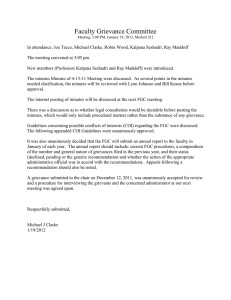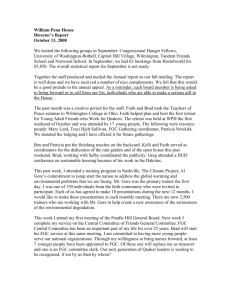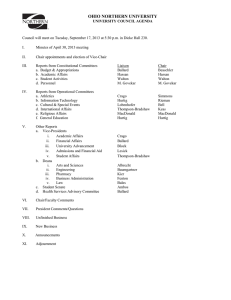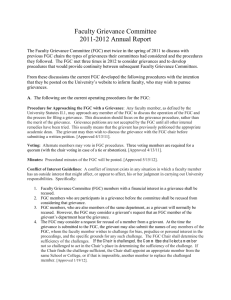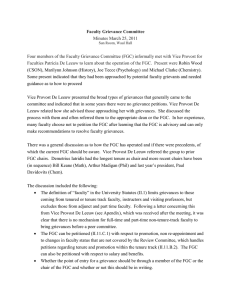Faculty Grievance Committee Minutes, April 13, 2011
advertisement
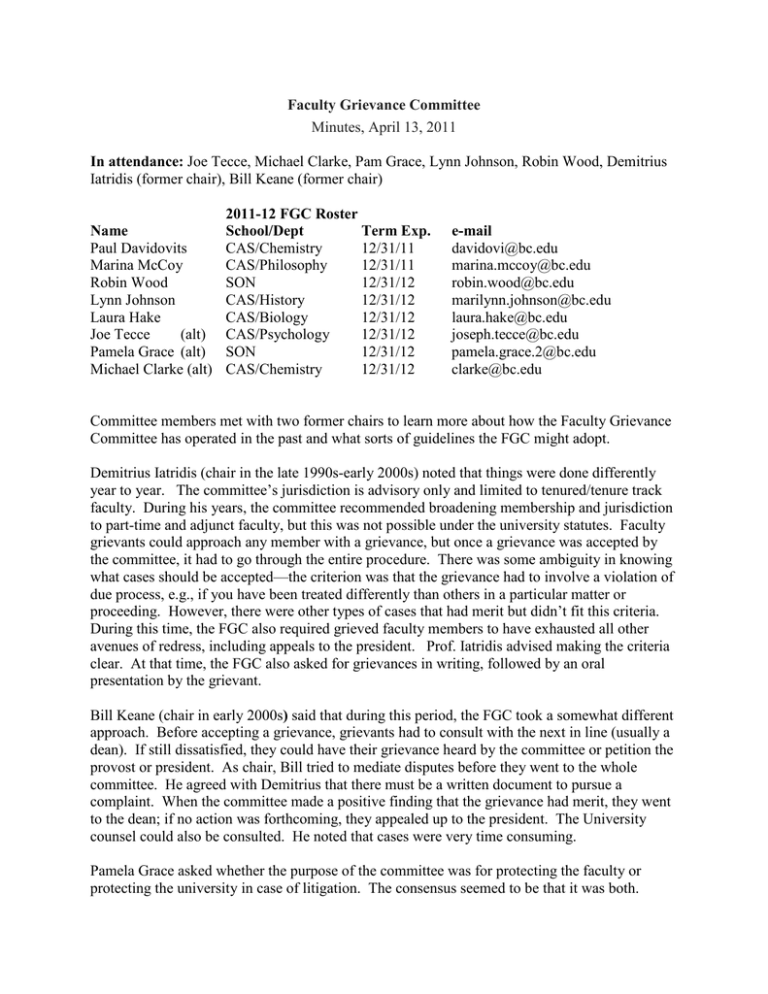
Faculty Grievance Committee Minutes, April 13, 2011 In attendance: Joe Tecce, Michael Clarke, Pam Grace, Lynn Johnson, Robin Wood, Demitrius Iatridis (former chair), Bill Keane (former chair) 2011-12 FGC Roster Name School/Dept Term Exp. Paul Davidovits CAS/Chemistry 12/31/11 Marina McCoy CAS/Philosophy 12/31/11 Robin Wood SON 12/31/12 Lynn Johnson CAS/History 12/31/12 Laura Hake CAS/Biology 12/31/12 Joe Tecce (alt) CAS/Psychology 12/31/12 Pamela Grace (alt) SON 12/31/12 Michael Clarke (alt) CAS/Chemistry 12/31/12 e-mail davidovi@bc.edu marina.mccoy@bc.edu robin.wood@bc.edu marilynn.johnson@bc.edu laura.hake@bc.edu joseph.tecce@bc.edu pamela.grace.2@bc.edu clarke@bc.edu Committee members met with two former chairs to learn more about how the Faculty Grievance Committee has operated in the past and what sorts of guidelines the FGC might adopt. Demitrius Iatridis (chair in the late 1990s-early 2000s) noted that things were done differently year to year. The committee’s jurisdiction is advisory only and limited to tenured/tenure track faculty. During his years, the committee recommended broadening membership and jurisdiction to part-time and adjunct faculty, but this was not possible under the university statutes. Faculty grievants could approach any member with a grievance, but once a grievance was accepted by the committee, it had to go through the entire procedure. There was some ambiguity in knowing what cases should be accepted—the criterion was that the grievance had to involve a violation of due process, e.g., if you have been treated differently than others in a particular matter or proceeding. However, there were other types of cases that had merit but didn’t fit this criteria. During this time, the FGC also required grieved faculty members to have exhausted all other avenues of redress, including appeals to the president. Prof. Iatridis advised making the criteria clear. At that time, the FGC also asked for grievances in writing, followed by an oral presentation by the grievant. Bill Keane (chair in early 2000s) said that during this period, the FGC took a somewhat different approach. Before accepting a grievance, grievants had to consult with the next in line (usually a dean). If still dissatisfied, they could have their grievance heard by the committee or petition the provost or president. As chair, Bill tried to mediate disputes before they went to the whole committee. He agreed with Demitrius that there must be a written document to pursue a complaint. When the committee made a positive finding that the grievance had merit, they went to the dean; if no action was forthcoming, they appealed up to the president. The University counsel could also be consulted. He noted that cases were very time consuming. Pamela Grace asked whether the purpose of the committee was for protecting the faculty or protecting the university in case of litigation. The consensus seemed to be that it was both. Lynn Johnson asked how many cases they dealt with and whether the administration had heeded their findings in those cases. Bill indicated that his committee had two full cases and several others mediated informally. To his knowledge, the university did not heed their finding on one case; in the other, the university prevailed and the committee concurred. Demitrius noted that the university may ignore our findings. In one case in which the FGC found for the grievant, the university took no action. He also noted that in rare instances, cases could end up in litigation and committee members might be asked to testify. In one case, the grievant’s lawyer came to meet with the committee, but the university counsel then also had to be present. He advises that the FGC not keep notes—courts can subpoena them. The FGC may request that both the grievant and the administrator against whom the grievance is filed appear together to discuss or mediate the dispute, which has been done in the past. Voting procedures have varied in the past, so that it appears to be up the current FGC to decide how to function in this regard. At this point, those present thanked the former chairs for coming and met as a committee to decide on membership duties and procedures. Minutes from the March 25 meeting were accepted unanimously. In the future, procedural minutes will be taken, circulated and approved by the committee. To ensure transparency, procedural minutes will also be made available online to the general faculty. Where and how they will be posted will be determined. To protect confidentiality, minutes will not be taken on substantive cases. The committee agreed that it would accept cases once the grievants have appealed at the decanal level. The committee chairperson should be able to act as a filter by discussing procedures with the grievant and proposing alternate remedies such as mediation. If the grievant decides to proceed, they must submit a written document detailing the case. The committee agreed that both members and alternates should be able to vote on cases unless there was a conflict of interest. Three votes are required for a quorum (with the chair voting in case of a tie or abstention). Michael Clarke was unanimously elected as committee chair. Respectfully submitted by Lynn Johnson, with revisions by Michael Clarke December 15, 2011
